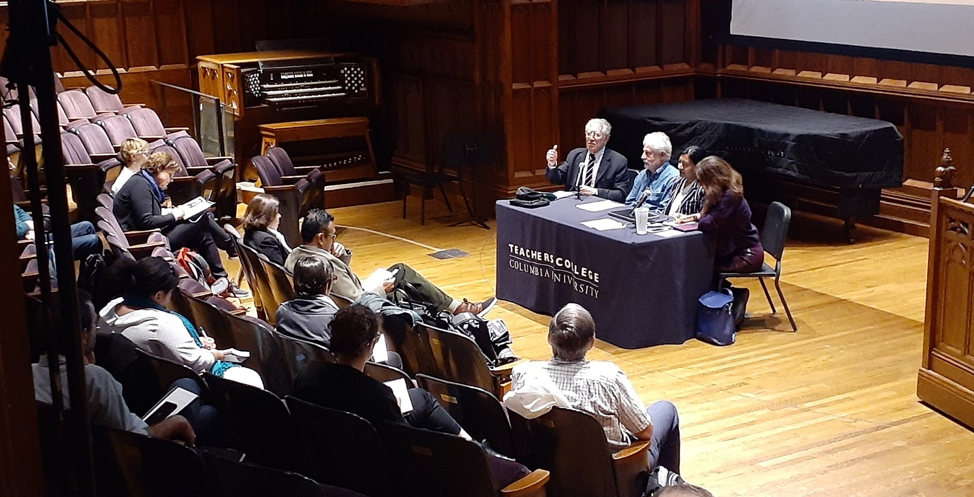Teachers College hosted the South-North Dialogue on Contemporary Education Policy in Latin America symposium on October 3, 2019. The event served as a platform for experts on Latin American education policy to compare trends and propose suggestions for reforms such as the global education agenda, policy reform, civic engagement, privatization, and teacher training. The conversation was organized under the leadership of Professor Regina Cortina of the International Education Program at TC in cooperation with the Institute of Latin American Studies at Columbia University.

First Panel. From left to right: Carlos Ornelas (UAM, Mexico), Robert Arnove (Indiana University), Zaira Navarrete (UNAM, Mexico), and Chair Victoria Murillo (Columbia University). Photo Credit: Romina Quezada Morales
In the first panel, Professor Zaira Navarrete (UNAM, Mexico) discussed how the Sustainable Development Goals are being approached in Latin America. These goals promulgated by the United Nations aim to end poverty, reduce inequality and injustice, and enact changes to deal with climate change. While most Latin American countries agreed on working toward the goals, the adoption of policies to achieve them has been slow and inconsistent.
Through the concept of Buen Vivir (Good Living), Heather Kertyzia (University for Peace, Costa Rica) argued that the purpose of education is to learn how to live well in relation to ourselves, our communities, and the global network of living beings. Pedagogies based on peace education have reduced violence, increased learning, and improved social relations when adopted by the communities. Both talks raised the question of who is responsible for the enforcement of the Sustainable Development Goals at the national and local levels.
Other presentations focused on the breadth of national education policy reforms in recent years. Professor Carlos Ornelas (UNAM, Mexico) stated that recent reforms have been driven by the pressure created by the PISA rankings to use Global Education Reform Movement indicators to compare different systems. For Ornelas, four basic elements appear in all recent educational reforms in Latin America: purposes, targeting of a traditional practice that needs transformation, use of political instruments and power to establish a hierarchy, and establishing neoliberal reforms for the sake of the economy.
Professor Bradley Levinson (Indiana University) complemented the case of Mexico by analyzing how educational reforms need to include student-centered activities and trans-curricular competencies to promote active participation in the government, instead of only focusing on critical thinking. Professor Levinson saw the centralized curriculum as a challenge to locally adapted civic education. He maintained that reform at the middle school level should give students purpose and a sense of belonging.
Attendants to the symposium could compare the case of Mexican reform with that of Chilean reform as well. Paula Louzano, Dean of the Faculty of Education at Diego Portales University in Chile, explained that domestic pressure outside of the government leads to reform, allowing for comparison with Ornelas’ Global Education Reform Movement framework. In Chile, it is important to raise the bar in teacher examinations in order to improve educational performance, as Dr. Louzano explained. Better working conditions such as good salaries and high-quality teacher training are also key to lead to effective educational reform. However, the excessive regulations of an “evaluative state”, as well as the high costs of training courses for teachers, continue to be obstacles to tackle.
Sandra Sales, from a Multidisciplinary Institute in Brazil, added to the discussion by talking about “zombie ideas”, by which she meant ideas that should not exist anymore but that are still around. One such idea is the belief that all of Brazil’s adult learners need to study the same concepts at the same time. Instead, she suggested the creation of new norms for adult education when training teachers. Pre-service teachers need more training opportunities since more than two-thirds of Brazil’s teacher education programs are in Rio de Janeiro, but only four offer internships.
From a historical perspective, Professor Mark Ginsburg from the University of Maryland highlighted the importance of teaching Comparative Education in Cuba. His analysis of the interactions between Cuban and US scholars since the 19th century led him to conclude that while comparative education was mainly an undergraduate topic at first, it became increasingly a graduate subject that moved towards the theoretical understanding of the dynamics within and between education and society.
Finally, Maria Balarin from Peru’s policy institute GRADE discussed the privatization of education in Peru as an alternative to public education by the urban poor. Contrary to other models of privatization, private schools in Peru aim to provide students who fail to enter the public system with the minimum of services in education. In this case, privatization does not lead to excellence. Peru’s case can be put in contrast with US perceptions on privatization in Puerto Rico, or neoliberal reforms as is the case of Argentina. Dr. Balarin’s work, along with that of Mark Ginsburg, is featured in Prof. Ornelas’ book Politics of Education in Latin America (2018), presented during the symposium.
Professor Emeritus Robert Arnove of Indiana University stressed that Latin America has been, and still is, fertile ground for education policy improvement. Latin America as a region also highlights the need to continue fostering academic dialogue in education policy. While there are no perfect education reforms, their ultimate goal is to form citizenship by encouraging active participation from individuals and develop those competencies that will allow them to engage with society at large. Although education reforms by the IMF and the World Bank, such as the adoption of STEM in Brazil in the 1990s, have de-emphasized the importance of developing the whole person, Latin America also provides examples of extremely successful reforms with an emphasis on community involvement programs, such as those in Cuba, which have achieved great transformations in their societies.
Authors:
Romina Quezada Morales, Doctoral Student in the ICE program
Jean Y. Taranger, Master’s Student in Anthropology and Education